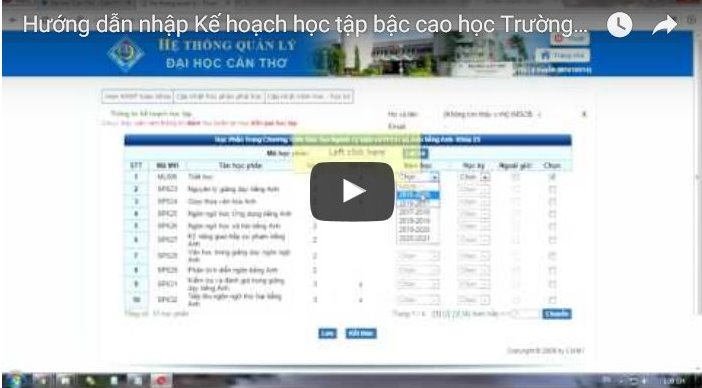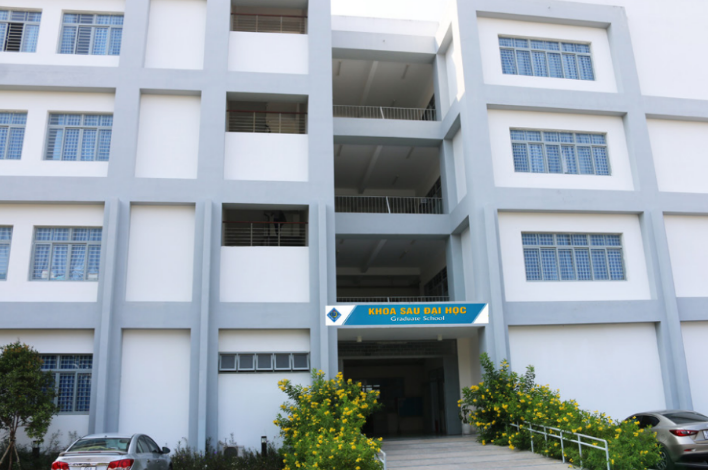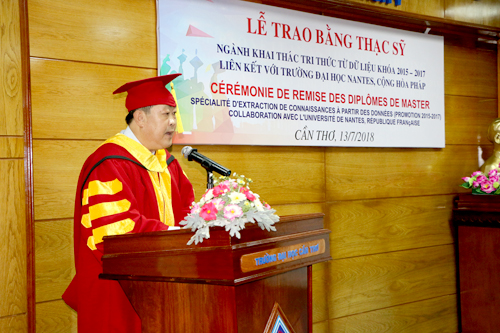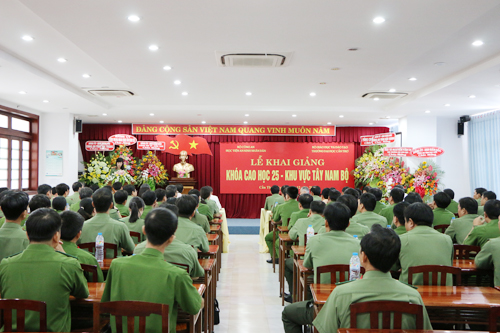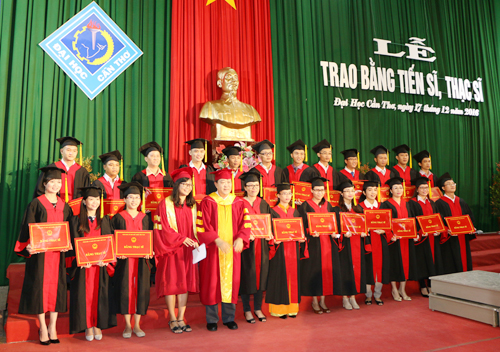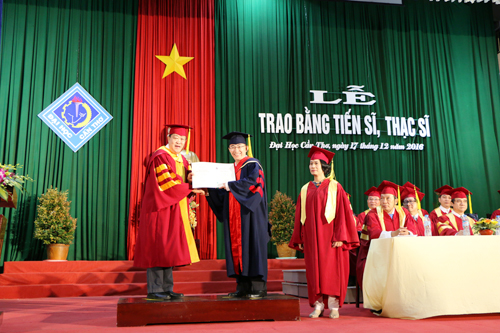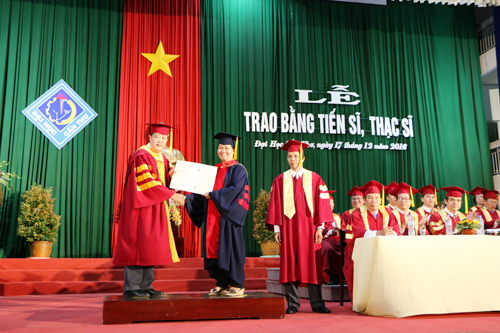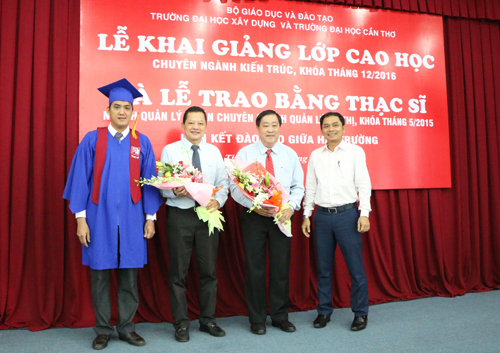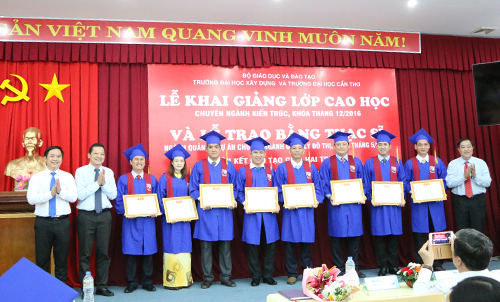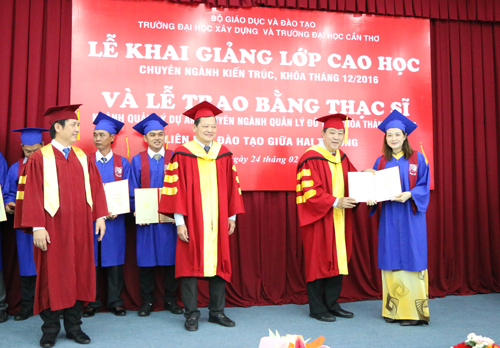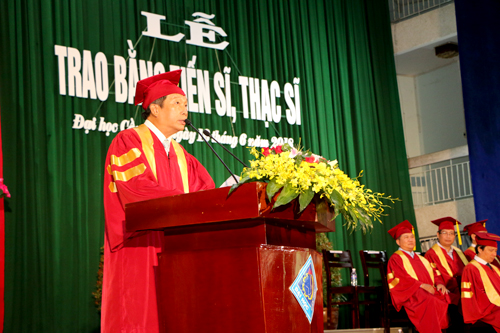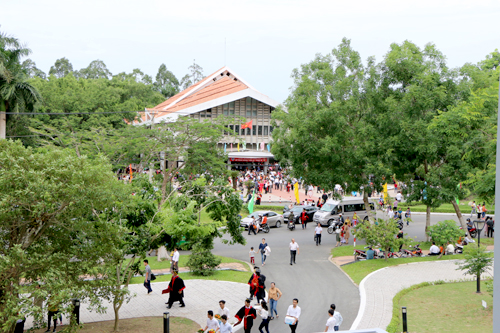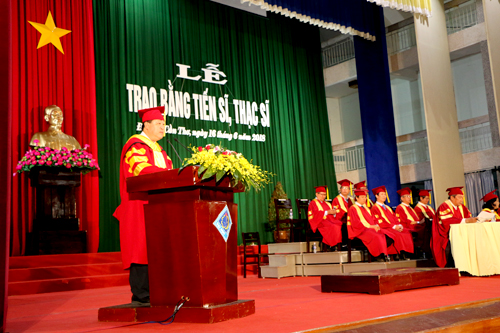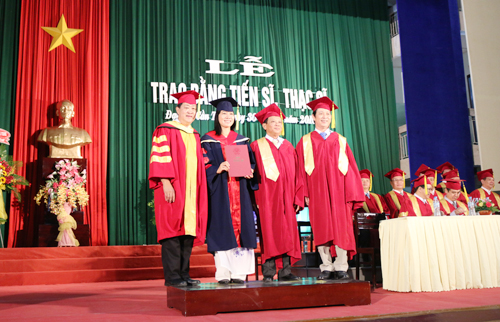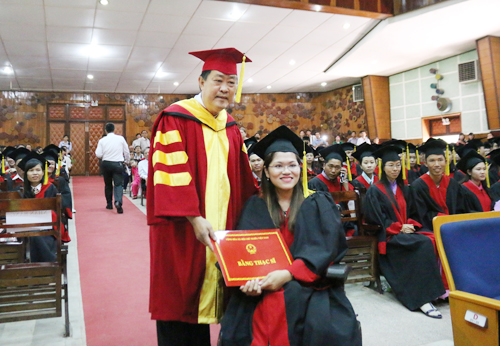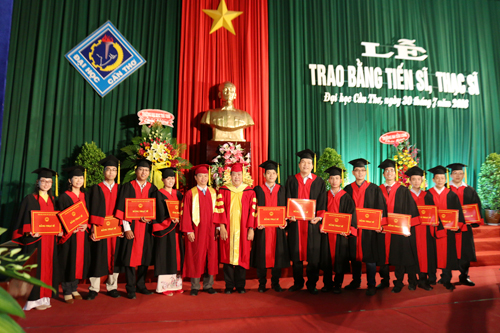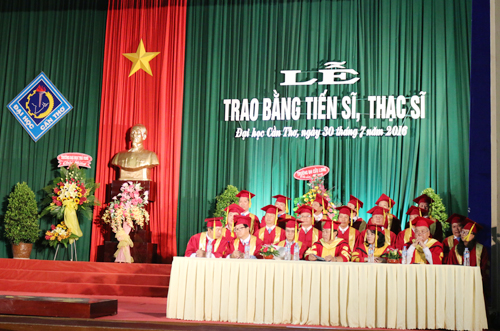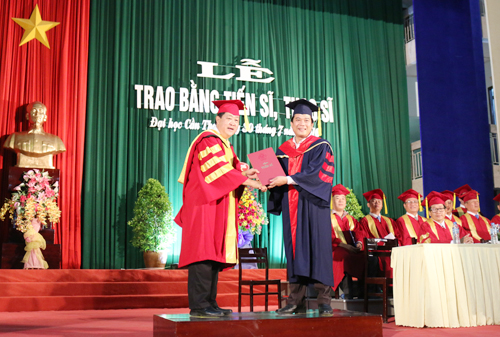
 Tên đề tài: “Chọn tạo các dòng đậu xanh (Vigna radiata L.) bằng đột biến EMS trên hai giống ĐX208 và Taichung”.
Tên đề tài: “Chọn tạo các dòng đậu xanh (Vigna radiata L.) bằng đột biến EMS trên hai giống ĐX208 và Taichung”.
 Tác giả: Trần Thị Thanh Thủy, Khóa: 2013
Tác giả: Trần Thị Thanh Thủy, Khóa: 2013
 Chuyên ngành: Khoa học cây trồng; Mã số: 62620110. Nhóm ngành: Nông, lâm nghiệp và thuỷ sản.
Chuyên ngành: Khoa học cây trồng; Mã số: 62620110. Nhóm ngành: Nông, lâm nghiệp và thuỷ sản.
 Người hướng dẫn chính: PGS.TS. Trương Trọng Ngôn - Trường Đại học Cần Thơ.
Người hướng dẫn chính: PGS.TS. Trương Trọng Ngôn - Trường Đại học Cần Thơ.
1. Tóm tắt nội dung luận án
Để chọn tạo giống đậu xanh mới ngắn ngày, năng suất cao, có trái chín đồng loạt bằng phương pháp chọn giống đột biến đề tài luận án đã thực hiện 6 nội dung nghiên cứu sau: (i) Gây tạo đột biến bởi ethyl methane sulphonate (EMS) lên 2 giống đậu xanh ĐX208 và Taichung; (ii) Ở thế hệ M1 trồng và xác định sức sống của các quần thể đột biến ở giai đoạn cây con, giai đoạn trổ hoa, hiệu suất và hiệu quả đột biến; (iii) Ở thế hệ M2 và M3 trồng và đánh giá các đột biến hình thái, xác định biến dị các đặc tính nông học và tuyển chọn các dòng đậu xanh đột biến có đặc tính tốt; (iv) Ở thế hệ M4 và M5 trồng và khảo nghiệm sơ khởi năng suất và khả năng chín đồng loạt ở các dòng đậu xanh đột biến; (v) Ở thế hệ M6 trồng và khảo nghiệm 33 dòng đậu xanh đột biến triển vọng dựa vào các đặc tính hình thái nông học và năng suất (vi) Ở thế hệ M6, phân tích gen có liên quan đến tính trạng khối lượng 1000 hạt và ngày trổ hoa của các dòng đột biến ưu tú bằng dấu SSR (Simple Sequence Repeat) và dấu SNPs (Single Nuleotide Polymorphism).
2. Những kết quả mới của luận án
- Đã tạo được nguồn vật liệu quý mang ưu điểm về tiềm năng năng suất
- Đề tài luận án đã tạo ra 11 dòng đột biến ĐX8-1-28-8B, ĐX6-5-1-10, ĐX4A-3-3-1, ĐX2- 1-26-5, TC8-4-3-5B, TC8-1-20-3, TC6-6-15-8, TC6-6-24-4, TC6-3-13-8, TC4-6-10-1, TC4-1-
- có ưu điểm ngắn ngày (56-62 ngày), trái chín đồng loạt, năng suất
- Kiểm tra được kiểu gen đồng hợp, đánh giá được sự sai khác di truyền và xác định mối quan hệ di truyền bằng dấu SSR ở các dòng đậu xanh đột biến được tạo
- Xác định được trình tự nucleotide của một số gen liên quan đến tính trạng khối lượng 1000 hạt của 6 dòng đột biến triển vọng TC6-3-13-8; TC2-1-33-11; TC8-4-3-5B; ĐX6-5-1-10; ĐX6-6-28-14; ĐX8-1-28-8B và 2 giống ĐX208 và Taichung bằng dấu
- Nồng độ thích hợp để gây tạo đột biến cho giống ĐX208 và Taichung là 0,2%
- Số trái trên cây, năng suất hạt/cây (g), và chiều cao cây được kiểm soát bởi gen cộng tính, do đó có thể áp dụng bất kỳ phương pháp chọn lọc nào cũng cải thiện được các tính trạng này.
3. Các ứng dụng/khả năng ứng dụng trong thực tiễn, các vấn đề cần tiếp tục nghiên cứu
- Đã tạo được nguồn vật liệu khởi đầu phục vụ cho công tác nghiên cứu chọn tạo giống đậu xanh mới.
- Mười một dòng đột biến ưu tú tạo được không những giúp nâng cao năng suất mà còn góp phần đa dạng hóa nguồn giống hữu ích cho việc tái cơ cấu cây trồng.
1. Summary of thesis content
For breeding new mungbean varieties with short days to maturity, high yields, synchronous maturity by the breeding mutant method, thesis has made 6 research contents as follows: (i) Induced mutation by ethyl methane sulphonate to DX208 and Taichung mungbean varieties ; (ii) In the M1 generation, planted and identification of mutant populations at seedling stage, flowering stage, mutagenic effectiveness and mutagenic efficiency; (iii) M2 and M3 generations planted and evaluated morphological mutations, identified variation in agronomic traits, and selected good mutant lines; (iv) M4 and M5 generations were planted and preliminarily tested for seed yield and synchronous maturity in mutant mungbean lines; (v) In the M6 generation planted and assay 33 potential mungbean mutant lines are based on agronomic morphology and seed yields. (vi) In the M6 generation, genes analysis is concerned with 1000 seed weight and flowering dates of the elite mutant lines with Simple Sequence Repeat (SSR) and Single Nucleotide Polymorphism (SNPs).
2. New results of the thesis
- It has created a valuable resource for high productivity
- The thesis has created 11 mutation lines DX8-1-28-8B, DX6-5-1-10, DX4A-3-3-1, DX2- 1-26-5, TC8-4-3-5B , TC8-1-20-3, TC6-6-15-8, TC6-6-24-4, TC6-3-13-8, TC4-6-10-1, TC4-1-
- have short days to maturity (from 56-62 days), synchronous maturity, high seed
- Genotypic assay, genetic variation, and genetic correlation with SSR were investigated in mutant
- Identification of nucleotide sequences of a number of genes related to 1000-seed weight traits of six promising mutant lines TC6-3-13-8; TC2-1-33-11; TC8-4-3-5B; DX6-5-1-10; DX6- 6-28-14; DX8-1-28-8B and two varieties DX208 and Taichung with
- Appropriate concentrations for mutagenicity of DX208 and Taichung were 0.2%
- The number of pods per plant, the seed yield per plant (g) and the plant height are controlled by the additive genes, so any selective method can be used to improve these
3. Applications/applicability in practice, issues to be studied:
Created initial materials for researching new mungbean varieties, eleven elite mutant lines created not only help improve productivity but also contributes to the diversification of useful seed sources for crop restructuring.
- Xem chi tiết nội dung luận án
- Xem thông tin đăng tải tại Website Bộ giáo dục và Đào tạo. (Nhập tên NCS vào ô tìm kiếm)

